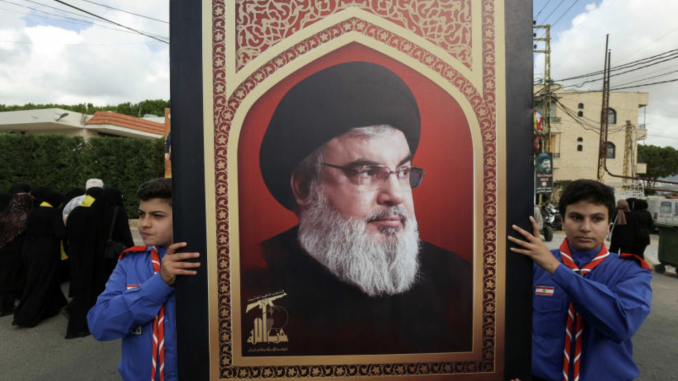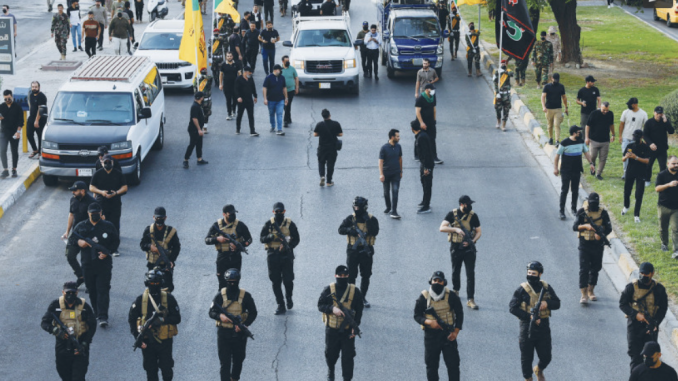The IDF airstrike on Hezbollah leader Hassan Nasrallah weakens Iran’s regional influence and disrupts Hezbollah’s operations.
By SETH J. FRANTZMAN | SEPTEMBER 28, 2024
 Boys scouts carry a picture of Hezbollah leader Sayyed Hassan Nasrallah in Kfar Melki, Lebanon, September 19, 2024 (photo credit: REUTERS/AZIZ TAHER)
Boys scouts carry a picture of Hezbollah leader Sayyed Hassan Nasrallah in Kfar Melki, Lebanon, September 19, 2024 (photo credit: REUTERS/AZIZ TAHER)
The airstrike that killed Hezbollah leader Hassan Nasrallah in Beirut on September 27 is a major game-changer after more than eleven months of war., and has the potential to upset Iran’s plans and weaken Hezbollah. Here are five ways the strike may affect the war and the region.
Iran’s most experienced ally targeted
Hassan Nasrallah was Iran’s most experienced ally in the region. The Hezbollah leader had been key to Iran’s plans in the region for decades. In the last several years, he had grown even more powerful. Iran sought to create a multi-front war against Israel in the wake of the October 7 attack. The assassinated terrorist leader helped lead that war.
Nasrallah had grown to become the senior leader of Iran’s numerous proxies. He would often host Iranian officials, and he would also invite representatives from Hamas and Palestinian Islamic Jihad to Lebanon to coordinate their attacks against the Jewish state. He also sought to muster the Houthis in Yemen to threaten Israel, and he coordinated with Iraqi militias.
The Hezbollah leader had worked with other key Iranian-backed leaders in the region; in recent years, Iran has seen many of them killed. This includes Qasem Soleimani of the IRGC and Iraqi militia leader Abu Mahdi al-Muhandis. With those critical leaders off the table, Nasrallah was increasingly filling many shoes. Now those shoes are empty again.
Hezbollah in disarray
Hezbollah is in disarray, having suffered numerous losses to its top leadership in recent days. On September 20, its Radwan force commanders were killed. This represented the loss of sixteen critical leaders in the terrorist group. In subsequent days it also lost the head of its drone unit. The loss of Hassan Nasrallah basically cuts the head off the whole organization. It is unclear if the Lebanese-based terrorist organization had prepared for this scenario.
 A
A
VEHICLE carrying the coffin of a commander from Iraq’s Ktaeb Hezbollah armed group, who was killed in what the militia called a ‘Zionist attack’ in Damascus on Friday, is seen during a funeral in Baghdad on Sunday. (credit: THAIER AL-SUDANI/REUTERS)
Hezbollah still has a vast quantity of weapons, including rockets, drones, anti-tank missiles, and precision-guided munitions. However, it will be in chaos and disarray without a clear chain of command or leadership. The group has struggled to respond to Israel’s attacks since the exploding pagers on September 17. It has seen itself suffer one unprecedented blow after another; this keeps the terrorist group off balance.
Hezbollah and Iran now know Israel is serious
Israel’s willingness to call Hezbollah’s bluff and go all-in with airstrikes in Beirut illustrates how serious Israel is about achieving its goals in the North. Israel’s cabinet approved adding the goal of returning residents to northern communities to the goals of the war in mid-September.
Israel then proceeded to immediately begin cutting Hezbollah into pieces. The terrorist group did not expect this. It believed Israel would continue to be on the defensive. Hezbollah also likely believed reports in Israel that Defense Minister Yoav Gallant, known for being a hawk on Hezbollah, would be removed. Instead, Gallant has led the body blows that Hezbollah is now suffering.
Hezbollah got complacent and got used to striking at Israel. Now, it sees how serious Israel is. However, the terrorist group cannot climb down from the tree. It has claimed it will continue to support Hamas and can’t stop that support without feeling shame. At the same time, it doesn’t have strong leadership that can make bold decisions.
Hezbollah expected to dictate the terms to Israel
Hezbollah believed that it was the driving force of this war. It had been attacking Israel for eleven months. It believed that Jerusalem would be pressured into a ceasefire and that the Jewish state would then stop fighting in the North. The terrorist group also expected that it would keep its arsenal largely intact. It did not expect Israel to force it to go on the defensive. The group was not ready for this and was ill-prepared for this kind of war.
Hezbollah had always expected that in any war with Israel, it would choose the time and place. It also expected to be able to take the initiative. Now, its plans have been destroyed, and it has lost so many critical commanders that it will take time to get back to normal and sort itself out. Having expected the war to be low intensity and end with a Hezbollah victory, its arrogance appears to have brought the organization close to ruin.
Hamas and Iran’s other proxies now see Israel’s resolve
Hamas had expected to survive this war and continue to control Gaza. It saw how Israel was fighting a cautious war in the coastal enclave, and expected that a ceasefire would eventually be forced on Israel. Hamas was happy to see Hezbollah pressuring Israel from the North. For eleven months, the Gaza-based terrorist group that perpetrated the October 7 massacre got used to having Hezbollah as a strong ally, able to threaten Israel with 150,000 rockets.
Now Hamas sees that Hezbollah is unable to contend with Israel’s blows. It also shows that Hezbollah’s rocket threat may have diminished. The now eviscerated terrorist group has rarely been able to fire more than a few hundred rockets a day, a lot less than the several thousand that estimates believed it could unleash.
Hamas now must wonder if it will soon suffer similar blows like the ones its northern partner in terrorism has suffered. Its leadership, such as Mohammed Deif and Marwan Issa, has also been eliminated. Hamas assumed that it could cling to power by simply continuing to exist.
Now, it has seen Israel’s resolve, and its vital ally in Lebanon severely weakened. Hamas must now wonder whether its decision to attack on October 7 has turned into a disaster for it and Iran’s group of proxies in the region. Instead of an endless threat to Israel, Hamas and Hezbollah have now seen the Jewish state take the initiative and succeed in subduing them.



I think Amir has gotten carried away with exuberance. Just staying within the confines of reality, though. God has protected Eretz Israel, and Am Israel, beyond anyone’s expectations.
Kol haKavod, IDF!
I believe what Israel is achieving in regard to Hezbollah was predicted in a number of X posts of Rabbi Herzog. He repeatedly predicted how major leaders would be falling and defeated.
“Basically Israel blocks Lebanon from the sea, land, and air to prevent Iranian weapons from entering straight to the hands of Hezbollah!”-Amir Tsarfati.
“Never in the history of warfare was a strong terror army such as Hezbollah so quickly and decisively defeated!”- Amir Tsarfati (Telegram)